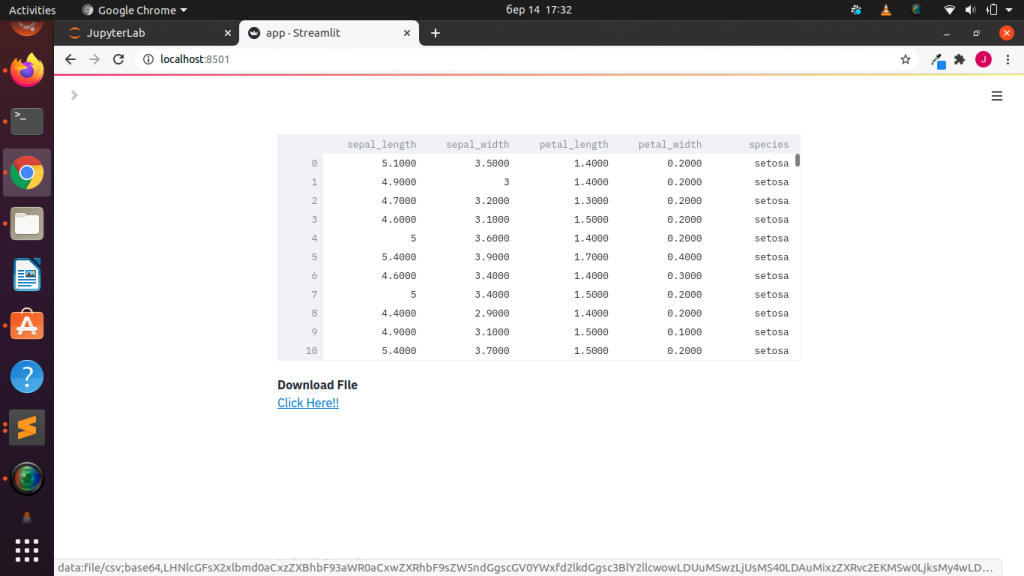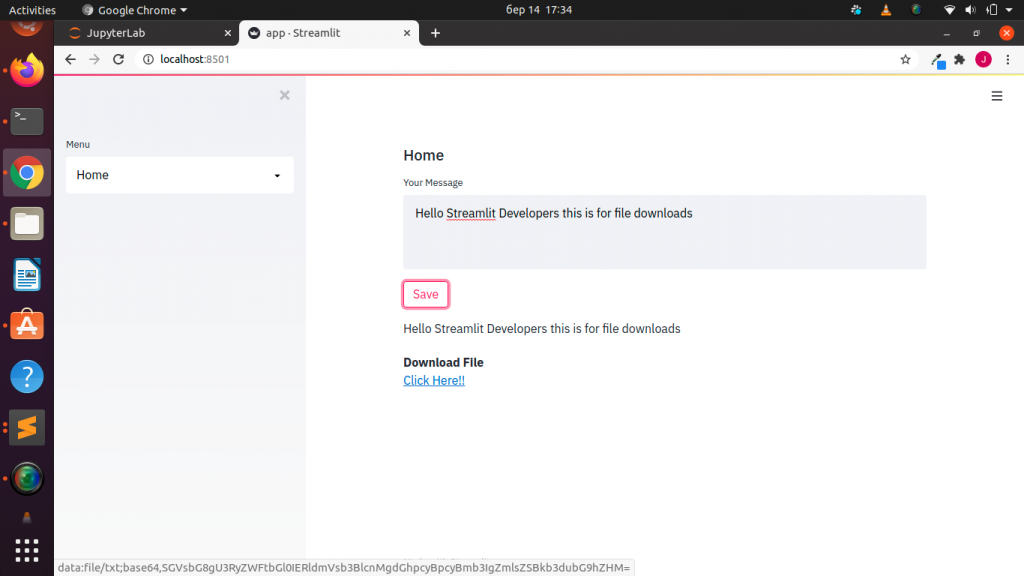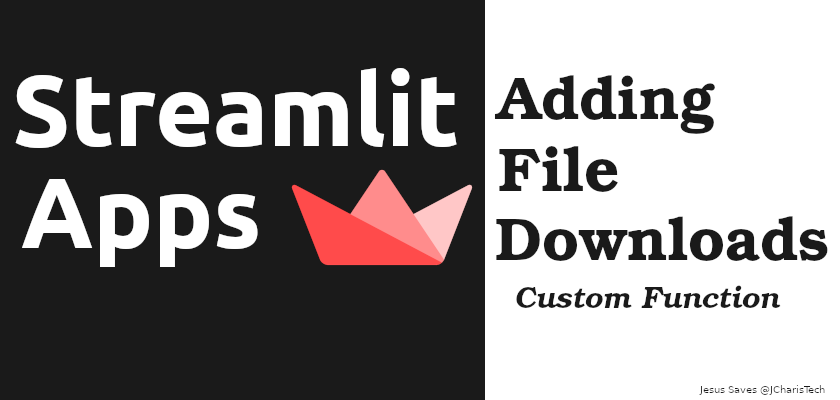In a previous post we saw how to add file uploads to our streamlit app. In this tutorial we will learn about how to add file downloads to our streamlit app.
By the end of this tutorial you will learn how to
- Based64 Encode & Decode Data
- Create File Download function for csv and txt files
- etc
The concept of file download allows us to download any other files from our app specifically csv and txt files.
Currently (circa 2021) there is no widget natively in streamlit to download files however streamlit is flexible. It offers a lot of cool features that can enable as to hack this feature out.
We will be using base64 library and streamlit markdown feature to enable us add file downloads to our app.
The secret behind file downloads in our app is using base64 to encode and decode our data in order to send it over the wire via an anchor tag (a href). Credit to the amazing developers on the streamlit forums for this function.
Let us see how to achieve that. We will be using two functions and then we will create a reusable class object to do the same.
def text_downloader(raw_text):
b64 = base64.b64encode(raw_text.encode()).decode()
new_filename = "new_text_file_{}_.txt".format(timestr)
st.markdown("#### Download File ###")
href = f'<a href="data:file/txt;base64,{b64}" download="{new_filename}">Click Here!!</a>'
st.markdown(href,unsafe_allow_html=True)Let us break down the code
The function text_downloader() receives as input a string. It will then convert to base64 using base64.b64encode()
The next line allows us to have a file name with a timestamp for convenience. We will then send the encoded variable via href to make it downloadable as a link.
Using streamlit.markdown() we will render the anchor tag as a link. Setting unsafe_allow_html =True enables the a href tag to be rendered correctly.
This same function can be applied for CSV file with the help of pandas.to_csv() , we can convert the data into a format we can base64 encode. Below is the code for that
def csv_downloader(data):
csvfile = data.to_csv()
b64 = base64.b64encode(csvfile.encode()).decode()
new_filename = "new_text_file_{}_.csv".format(timestr)
st.markdown("#### Download File ###")
href = f'<a href="data:file/csv;base64,{b64}" download="{new_filename}">Click Here!!</a>'
st.markdown(href,unsafe_allow_html=True)
Moreover you can convert these functions into a class object as below
# Class
class FileDownloader(object):
"""docstring for FileDownloader
>>> download = FileDownloader(data,filename,file_ext).download()
"""
def __init__(self, data,filename='myfile',file_ext='txt'):
super(FileDownloader, self).__init__()
self.data = data
self.filename = filename
self.file_ext = file_ext
def download(self):
b64 = base64.b64encode(self.data.encode()).decode()
new_filename = "{}_{}_.{}".format(self.filename,timestr,self.file_ext)
st.markdown("#### Download File ###")
href = f'<a href="data:file/{self.file_ext};base64,{b64}" download="{new_filename}">Click Here!!</a>'
st.markdown(href,unsafe_allow_html=True)We can check the whole code for the app below

import streamlit as st
import streamlit.components as stc
# Utils
import base64
import time
timestr = time.strftime("%Y%m%d-%H%M%S")
import pandas as pd
# Fxn
def text_downloader(raw_text):
b64 = base64.b64encode(raw_text.encode()).decode()
new_filename = "new_text_file_{}_.txt".format(timestr)
st.markdown("#### Download File ###")
href = f'<a href="data:file/txt;base64,{b64}" download="{new_filename}">Click Here!!</a>'
st.markdown(href,unsafe_allow_html=True)
def csv_downloader(data):
csvfile = data.to_csv()
b64 = base64.b64encode(csvfile.encode()).decode()
new_filename = "new_text_file_{}_.csv".format(timestr)
st.markdown("#### Download File ###")
href = f'<a href="data:file/csv;base64,{b64}" download="{new_filename}">Click Here!!</a>'
st.markdown(href,unsafe_allow_html=True)
# Class
class FileDownloader(object):
"""docstring for FileDownloader
>>> download = FileDownloader(data,filename,file_ext).download()
"""
def __init__(self, data,filename='myfile',file_ext='txt'):
super(FileDownloader, self).__init__()
self.data = data
self.filename = filename
self.file_ext = file_ext
def download(self):
b64 = base64.b64encode(self.data.encode()).decode()
new_filename = "{}_{}_.{}".format(self.filename,timestr,self.file_ext)
st.markdown("#### Download File ###")
href = f'<a href="data:file/{self.file_ext};base64,{b64}" download="{new_filename}">Click Here!!</a>'
st.markdown(href,unsafe_allow_html=True)
def main():
menu = ["Home","CSV","About"]
choice = st.sidebar.selectbox("Menu",menu)
if choice == "Home":
st.subheader("Home")
my_text = st.text_area("Your Message")
if st.button("Save"):
st.write(my_text)
# text_downloader(my_text)
download = FileDownloader(mytext).download()
elif choice == "CSV":
df = pd.read_csv("iris.csv")
st.dataframe(df)
# csv_downloader(df)
download = FileDownloader(df.to_csv(),file_ext='csv').download()
else:
st.subheader("About")
if __name__ == '__main__':
main()To conclude we have seen how to add file downloads to our streamlit app. You can also check out the video tutorial below
